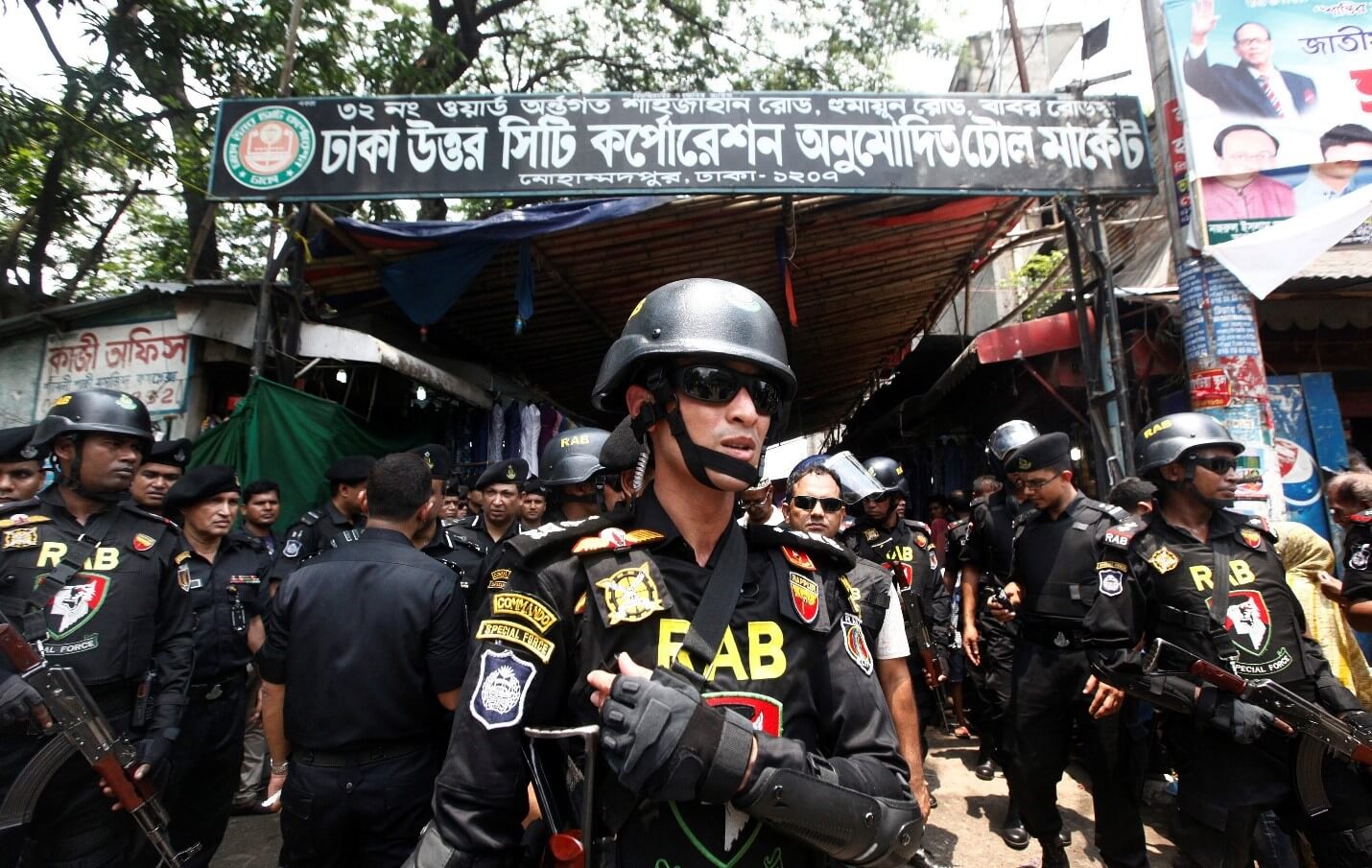Al Jazeera reported on Tuesday that the United Kingdom (UK) had reversed its decision to sanction the Bangladeshi Rapid Action Battalion (RAB) in 2021 for unknown reasons despite having evidence of human rights violations.
In response to the claims, the UK Foreign Office reiterated that it is the “leading advocate for human rights” worldwide and raises any issues it may have with governments directly. However, the Office did not deny that it had reversed the decision.
Several sources have confirmed that British authorities decided at the “eleventh hour” to not introduce sanctions that would have matched those imposed by the United States, which invoked punitive measures against the RAB earlier that year.
In December 2021, the US sanctioned seven high-ranking current and former RAB officials owing to allegations torture and forced disappearances.
The US Treasury said last December that the RAB has committed “serious” human rights abuses as part of the Bangladeshi government’s war on drugs. The decision was based on reports by several non-governmental organisations alleging that the RAB is responsible for more than 600 disappearances since 2009, almost 600 extrajudicial killings since 2018, and torture. The Battalion has also targeted opposition party members, journalists, and human rights activists.
The Al Jazeera report quoted Asian Human Rights Commission liaison officer Mohammad Ashrafuzzaman, who had produced evidence of the human rights abuses, saying that the US and UK were provided with the same evidence, which was enough for Washington to impose sanctions.
British barrister Toby Cadman, who led the team that called on the US and UK to impose sanctions on the Bangladeshi force, said that all those involved were surprised as a “coordinated response was necessary.” He added, “It was certainly my position that the UK would issue mirror sanctions in coordination with the US. I was extremely disappointed when they failed to do so.”
RAB is accused of human rights abuses including extrajudicial killings and torture.
— Al Jazeera Investigations (@AJIunit) December 6, 2022
“The expectation was that the UK and US would be collaborating with each other...
The US did that, the UK didn’t” says @ZamanAshraf, who provided evidence for the sanctions request.
According to Strayer, supervising staff lawyer for accountability at Human Rights First, the US government consults its allies like the UK, Canada, or the European Union to take “joint action” while considering such sanctions. To this end, she said, “The fact that at that time and still now, a year later, these jurisdictions haven’t taken any action, it’s very disappointing.”
Likewise, Ashrafuzzaman said that the US and UK being “strong allies”, were expected to cooperate and announce “back-to-back sanctions.” He reiterated that the UK’s decision was “surprising.”
Cadman clarified that while the government rejects such requests on several occasions, they are usually complimented with reasons for their decision, such as lack of evidence. However, he said that the UK’s decision on the RAB provided no clarifications or justifications.
While refraining from providing more details about the sanctions request, Cadman highlighted that he had discussed the matter with the Foreign, Commonwealth, and Development Office.
The Bangladeshi government set up the RAB in 2004, intending to counter extremism and other serious crimes committed in Bangladesh. While the country’s Home Ministry officials lead it, it is said to be strongly influenced by the country’s military. In fact, not only does the military control its actions and operations, but armed forces officers are also often seen taking up the most senior positions in the unit.
As if asking for more sanctions, Bangladesh authorities have responded to US sanctions on the notoriously abusive Rapid Action Battalion by retaliating against victims’ relatives, human rights defenders and their families, and human rights organizations. https://t.co/HwP1HyKWWY pic.twitter.com/dOVdJY2Xbe
— Kenneth Roth (@KenRoth) April 8, 2022
Through the years, it has been accused by several rights organisations and activists of committing gruesome human rights violations. In fact, Outlook citing unnamed officials, reported in November that the RAB caused a mass exodus of 274 members of the Kuki-Chin-Mizo community, including 125 women and children, across the border into Mizoram. Mizoram government officials also confirmed the arrival of the asylum seekers. The exodus came shortly after the Kuki-Chin National Army, an armed separatist ethnic group, clashed with the RAB.
Previously, human rights organisations have called the RAB the “death squad” for its wide-ranging atrocities. In January, several human rights organisations addressed a letter to the United Nations (UN) peace operations highlighting “consistent and credible evidence” of abuses committed by the RAB in peacekeeping missions, including “extrajudicial killings, torture and enforced disappearances by members of this unit since its creation in 2004.”
Furthermore, in March 2021, the incidents of human rights abuses by the RAB were highlighted by the United Nations High Commissioner for Human Rights, Michelle Bachelet. She said that the allegations against the unit have been a “long-standing concern.” Bangladesh’s 2019 human rights review also highlighted the RAB’s problematic activities.
Nevertheless, the Bangladeshi government has defended the RAB as a necessary mechanism to counter terrorism and other transnational crimes. In fact, Bangladeshi Foreign Minister AK Abdul Momen reiterated this during his meeting with his Indian counterpart S. Jaishankar in April, urging him to help with discussions to reverse the US sanctions.

